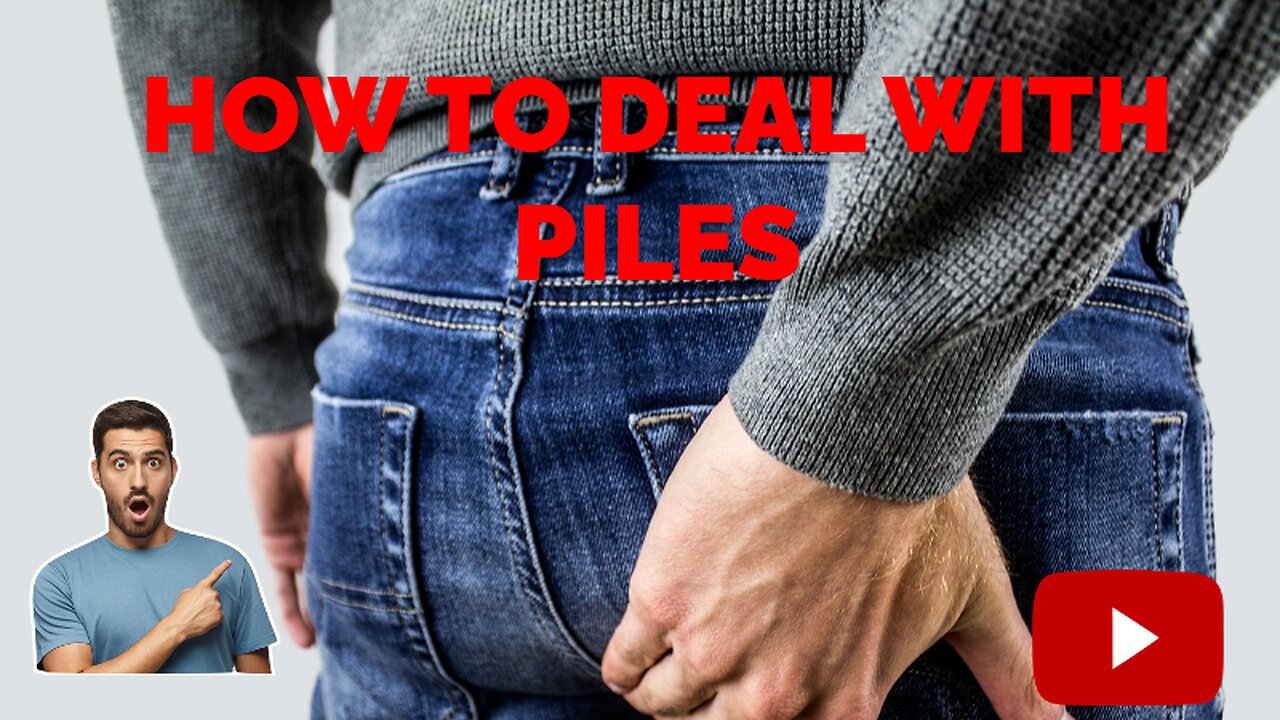Premium Only Content

how to deal with piles
I'm not a doctor, but I can offer some general information on how to deal with piles, also known as hemorrhoids. It's important to consult a healthcare professional for personalized advice and treatment options. Hemorrhoids can be uncomfortable and painful, but there are several steps you can take to manage them:
Consult a Healthcare Professional: If you suspect you have hemorrhoids or are experiencing persistent symptoms, it's essential to consult a healthcare provider. They can provide an accurate diagnosis and recommend appropriate treatment options.
Dietary Changes:
Increase Fiber Intake: Eating high-fiber foods like fruits, vegetables, whole grains, and legumes can soften your stool and make it easier to pass, reducing strain during bowel movements.
Drink Plenty of Water: Staying hydrated helps prevent constipation, which can aggravate hemorrhoids.
Good Bathroom Habits:
Avoid Straining: Straining during bowel movements can worsen hemorrhoids. Try to relax and let bowel movements occur naturally.
Don't Delay: When you feel the urge to have a bowel movement, go to the toilet promptly. Delaying can lead to constipation.
Over-the-Counter (OTC) Treatments:
OTC creams, ointments, or suppositories containing hydrocortisone or witch hazel may help relieve pain, itching, and inflammation.
Sitz Baths: Soaking your anal area in warm water for about 15 minutes several times a day can help reduce discomfort and promote healing.
Prescription Medications: In some cases, a healthcare provider may prescribe stronger medications to manage pain or reduce inflammation.
Lifestyle Changes:
Avoid sitting for prolonged periods.
Engage in regular physical activity to improve circulation.
Practice good anal hygiene but avoid excessive wiping, which can irritate the area.
Hemorrhoid Procedures:
Rubber Band Ligation: A doctor may use rubber bands to cut off blood supply to the hemorrhoid, causing it to shrink and fall off.
Infrared Coagulation (IRC): This procedure uses heat to coagulate the blood vessels that feed the hemorrhoid, causing it to shrink.
Surgical Removal: Severe cases of hemorrhoids may require surgical removal.
Preventive Measures: After successfully treating hemorrhoids, continue with a high-fiber diet, adequate hydration, and good bathroom habits to prevent their recurrence.
Remember, it's crucial to consult a healthcare professional to determine the best course of action for your specific situation. They can provide guidance on the most appropriate treatments based on the severity and type of hemorrhoids you have.
-
 1:10:04
1:10:04
John Crump Live
4 hours ago $2.59 earnedYes I talked To The ATF
30.7K3 -
 6:01:28
6:01:28
Amish Zaku
7 hours agoVerDanceKey Warzone - Birthday Fun
33.1K5 -
 LIVE
LIVE
NeoX5
4 hours agoKhazan: The Road Less Taken | Part 5-2 | Rumble Studio | Rumble Gaming
270 watching -
 LIVE
LIVE
TwinGatz
10 hours ago🔴LIVE - He Is Doing His Best | ARMA Reforger
558 watching -
 54:40
54:40
LFA TV
14 hours agoSee God in the Trade War | TRUMPET DAILY 4.7.25 7PM
55.5K12 -
 1:18:30
1:18:30
Sarah Westall
7 hours agoNew Study: EMFs Literally Put You into a Brainwave Cage; Reclaiming your Mind w/ Ian & Philipp
71.3K20 -
 35:54
35:54
SantaSurfing
8 hours ago4/7/2025 - Trump Tariff impacts - he wants no Capital Gains Tax! Inflation falls to 1.22%!
41.9K29 -
 59:17
59:17
We Like Shooting
19 hours ago $2.62 earnedDouble Tap 404 (Gun Podcast)
28K -
 10:06:28
10:06:28
ZWOGs
12 hours ago🔴LIVE IN 1440p! - GRAPHIC DESIGN, Schedule 1, TARKOV, GTAV RP!! | Dwindle Digby | - Come Hang Out!
24.6K -
 4:51:28
4:51:28
Meisters of Madness
8 hours agoThymeSia - Power of the Plague
19.5K